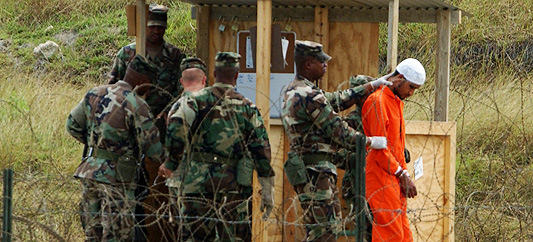
Imprisoned for six years without being charged or given a trial, Al Jazeera cameraman Sami Al Hajj was finally released from the US Navy prison camp at Guantanamo Bay, Cuba. The man, who was "emaciated," as his attorney said, because of his hunger strike which began in January 2007, was taken to a hospital and later arrived home in the Sudanese capital of Khartoum.
"I've been dreaming of this moment for the past seven years," the cameraman said in an interview with Al Jazeera. Saying that "rats are treated with more humanity", Al Hajj also said that the inmates' "human dignity was violated".
Al Hajj was accused of being an "enemy combatant" after he was captured in Afghanistan in December 2001 by Pakistani authorities, who handed him to the US military. He was later taken to Guantanamo Bay, the place where more than 275 men suspected of links with Al Qaeda are imprisoned, most of them without charges.
In addition to torture and harsh conditions, the US officials also tried to tempt Sami Al Hajj to work for them as a spy in Al Jazeera in exchange for his freedom; he was later offered release again on the condition he not go back to Al Jazeera: Sami rejected both offers. So why did the US government finally decide to release him?
The answer is simple: Guantanamo or "Gitmo" as known by US military circles has become a major liability to the United States and the Bush Administration. Many experts believe that there are striking similarities between the actions at Guantanamo and what occurred at Abu Ghraib in Iraq. For example, according to a newly released military investigation, stubborn prisoners at Guantanamo were forced to wear women's underwear on their heads while confronted with snarling military guard dogs. These tactics were employed at Guantanamo months before military police used them on detainees at the Abu Ghraib prison in Iraq and months before their photos caused alarm around the world.
In June 2006, three detainees at Guantanamo committed suicide by hanging themselves with nooses made from bed sheets. Human rights groups say dozens more have attempted to kill themselves.
According to Al Hajj's attorney, David Remes, Al Hajj had been released because the Bush administration "wants to flush as many men out of Guantanamo as quickly as possible ... as Guantanamo has become such an international badge of shame."
The facility has been condemned by the United Nations, the European Union, and numerous human rights groups, and many in the U.S. argue that the camp has become a liability. Even George Bush acknowledged in 2006 he would "like to close" it.
Will this administration shut down "Gitmo" before the arrival of Obama, Clinton, or McCain?
In their own words:
Obama: We need to bring to a close this sad chapter in American history, and begin a chapter that passes the might of our military to the freedom of our diplomacy and the power of our alliances. And while we are at it, we can close down Guantanamo and we can restore habeas corpus and we can lead with our ideas and our values.
Clinton: Guantanamo has become associated in the eyes of the world with a discredited administration policy of abuse, secrecy, and contempt for the rule of law. Rather than keeping us more secure, keeping Guantanamo open is harming our national interests. It compromises our long term military and strategic interests, and it impairs our standing overseas. I have certainly concluded that we should address any security issues on what to do with the remaining detainees, and then close it once and for all.
McCain: I would close Guantanamo Bay. And I would move those prisoners to Fort Leavenworth. And I would proceed with the tribunals.
Jamal Dajani produces the Mosaic Intelligence Report on Link TV